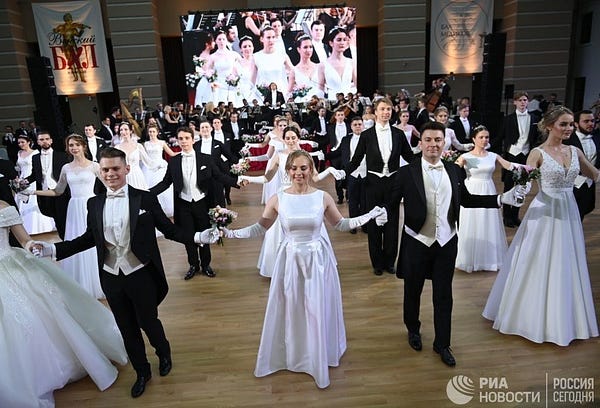What a day.
It began with the news that 400 doctors, nurses, pharmacists and other medical professionals had gathered over the weekend in Moscow for a Viennese-style ball — maskless and socially un-distanced — even as Coronavirus cases in the country continue their unabated climb.


By the end of the day, farce had given way to tragedy, as the Russian Prosecutor General announced it was declaring Bard College — a US liberal arts school, which has a mini-campus in St. Petersburg — an “undesirable organization”, meaning that all foreign professors and students will be barred from Russia, while any Russian citizens who maintain a relationship with the institution could face up to six years in prison.


On the face of it, these are two very different stories. In the first, a cynical cadre of black-tied and white-frocked medics unironically (but certainly not unwittingly?) channel Edgar Allen Poe. In the second, the government moves hard against the one Western academic institution that has made a real investment in Russia, building the country’s only functioning liberal arts program, through a partnership with St. Petersburg State University.
But they are, in fact, the same story. Here’s why.
In the invitation to the Medics’ Ball, the organizers announced that they were “restoring traditions of the estate” — the “estate” in question, in the French sense of the word, being medical professionals, an evidently protected and privileged caste, whose status, it seems, entitles them to frolic amid the flames. To be clear, I don’t think most — or even many — Russian medics would see themselves in this particular mirror. But Sunday’s waltzers did, as did the organizers.
And they’re far from alone. The Russian sociologist Simon Kordonsky has described the emergence of such “estates” — сословия, in Russian — from among the debris of Soviet collapse and post-Soviet dislocation, and not in endearing terms. These estates are not classes, which, after all, are defined by their relationship to the means of production. Estates, by contrast, are defined by service, and that service embeds all of its deliverers in a kind of collective bargain with the state: people are afforded a status ostensibly commensurate with the value of the service their estate provides, are told what they owe and what is owed to them, are given a place in the hierarchy of predators and prey, and are afforded a degree of protection. (For a sharp-edged dissection of Kordonsky’s analysis, hop over to Jeremy Morris’s blog.)
The problem is, it’s an imagined bargain. There are, arguably, two key estates — the security services and the oil men — without whose loyal service the Kremlin cannot govern, and so they get the choices cuts, and the list of jailed security men or oil men is comparatively short. As everyone else jostles for scraps — investors and entrepreneurs, politicians and bureaucrats, even doctors — they come to believe that they, too, are estates, and thus that they also have a place in this system, that they provide a service of value, and are valued accordingly.
If the dancing doctors were living the dream, the faculty and students at the Faculty of Liberal Arts and Sciences at St. Petersburg State University — a partnership with Bard, with roots going back to 1996, and run by none other than Alexei Kudrin, the former finance minister turned Audit Chamber chairman and self-appointed protector of a few things liberal — were watching it crumble.
The news about Bard shattered a number of illusions. Bard should have been safe, because it’s a university, not an NGO or a media outlet, the usual targets of the Kremlin’s crusade against Western influence. Bard should have been safe, because its Russian project is headed by one of the few men who can pick up the phone and call Vladimir Putin. Bard should have been safe, because it preemptively purged itself of dissident professors, thus proving its loyalty. I could go on.
The truth, of course, is that these were stories that Bard and its allies in Russia — and those allies include everyone who would like to see robust collaboration between Russian and Western universities, collaboration that will now almost certainly be severely curtailed — told themselves. But that’s all they ever were: stories told in order to help the impermanent seem more permanent, the untenable more tenable.
Bard and the rest of us will now need to adjust not to a new reality, but to an old reality that we had been unwilling or unable to recognize. In many ways, it is a reality that makes more sense than the one we had perceived before: a reality in which the rules are clearer and brook fewer exceptions, and in which no more effort need be expended on the maintenance of illusions.
The doctors, alas, are unlikely to notice. Illusions, after all, have their attractions.



It would be useful to learn if data will emerge from the noble medical experiment, on a parallel with an official one in May :Liverpool Maskless and Sweaty: Clubbing Returns to Britain for a Weekend
In Liverpool, people danced together at a warehouse party as part of a scientific trial of how and if social distancing can safely end But under more rigorous conditions